March 3, 2025 | CBC Radio – Ontario Today with Amanda Pfeffer
During the winter break, graduate students from the University of Toronto’s Department of Civil & Mineral Engineering (CivMin) participated in a structural engineering tour of the construction site for The One.
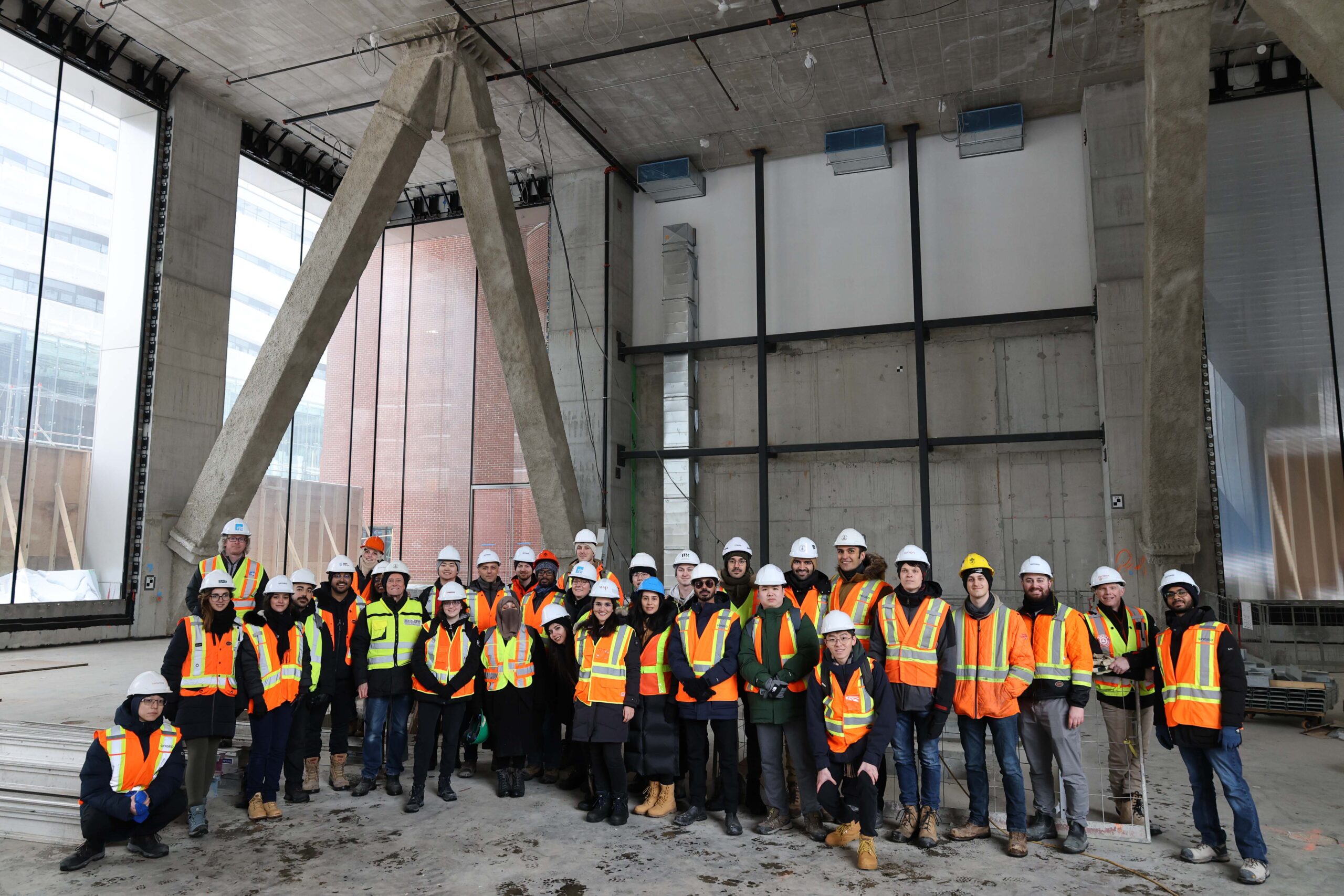
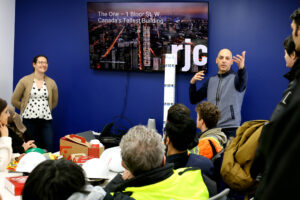
The February 20 tour began with a presentation at the SKYGRiD office by alumna Cora Pulnicki (MEng 1T8), who is the project’s structural design engineer with RJC. Presenters also included SKYGRiD construction manager Giancarlo Fucile (CivE 9T7 + PEY), RJC associate Dr. Andrew Voth (CivE 0T4, CivMin PhD 1T0), as well as David DeVisser and Corneil Byl, engineers from the project’s steel fabricator Walters Group Inc..
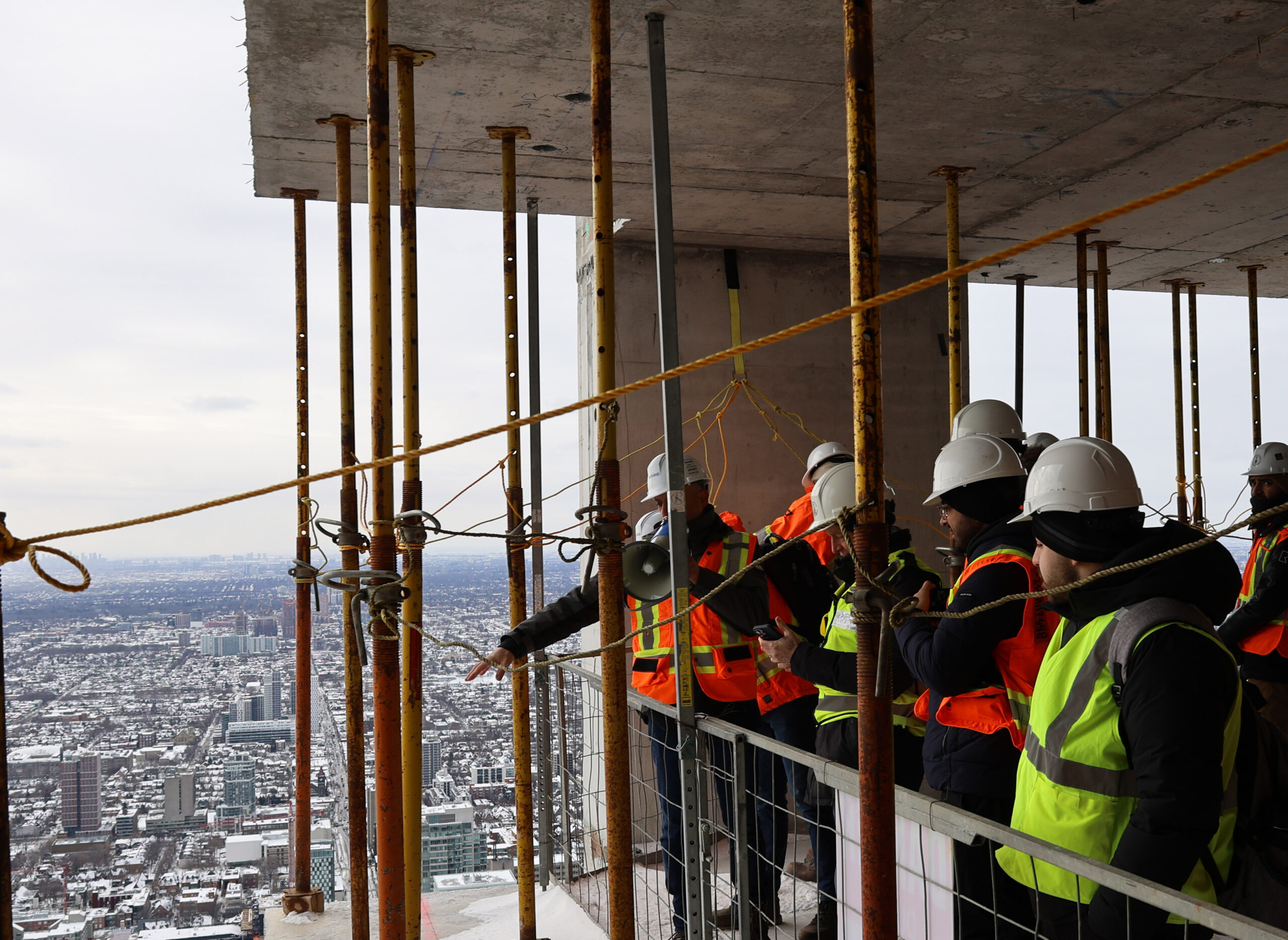
Reflecting on the tour, CivMin Professor Packer says, “It’s a good reminder that structural design has a real outcome – it actually results in a physical building – which gives a tremendous sense of pride for the designers, but it’s also a great responsibility.
The pinnacle of the tour was a visit to the 74th floor of The One, offering spectacular vistas over the downtown core and Lake Ontario. Once completed, the tower will be Canada’s tallest residential building and its first supertall skyscraper – exceeding 300 metres – as defined by the Council on Tall Buildings and Urban Habitat. The revised height stands at 308.6 metres (1,013 feet) with 85 storeys. The structure is centred around a 100-by-100-foot retail space featuring soaring 37-foot ceilings, with no interior or corner columns, showcasing its unique structural system and inclined struts.
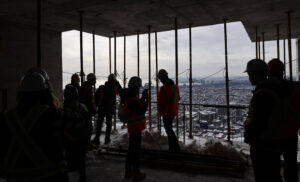
Commenting on the value of the experience for students, Prof. Packer reflects, “Seeing how a record-breaking tower gets built – even on the coldest days of winter – and finding our very own alumni presenting on their design and construction roles offered a unique perspective.”
By Galina Nikitina
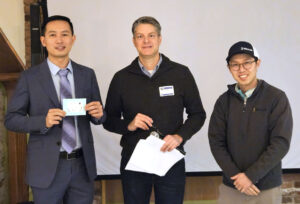
Junzhe (David) Liu, a CivMin PhD student under the supervision of Prof. John Harrison, has won the Best Oral Presentation Award at the Canadian Geotechnical Society -Southern Ontario Section’s annual Graduate Presentation Competition.
The CGS-SOS awarded Liu the honour at a January 22, 2025 event in Toronto with a distinguished panel of judges from academia and industry evaluating the presentations. Each participant delivered a 12-minute presentation, followed by a five-minute Q&A session, showcasing their research and presentation skills.
In his presentation titled ‘Improving Methodological Reliability in Application of Rock Mass Classifications: Likert Scale and Bayesian Ordinal Approaches’, Junzhe introduced a new approach to addressing challenges in rock mass classification systems. This study highlights the limitations of conventional Likert-scale ratings in quantifying subjective parameters such as weathering due to their ordinal nature and rigid empirical scoring. To enhance the accuracy and reliability of rock mass classifications, the research explores Bayesian ordinal models, which allow for unequal spacing between categorical ratings. By incorporating these models, the study demonstrates improvements in the robustness and granularity of rock mass classification, ultimately contributing to more reliable rock engineering design.
The results were announced on LinkedIn.
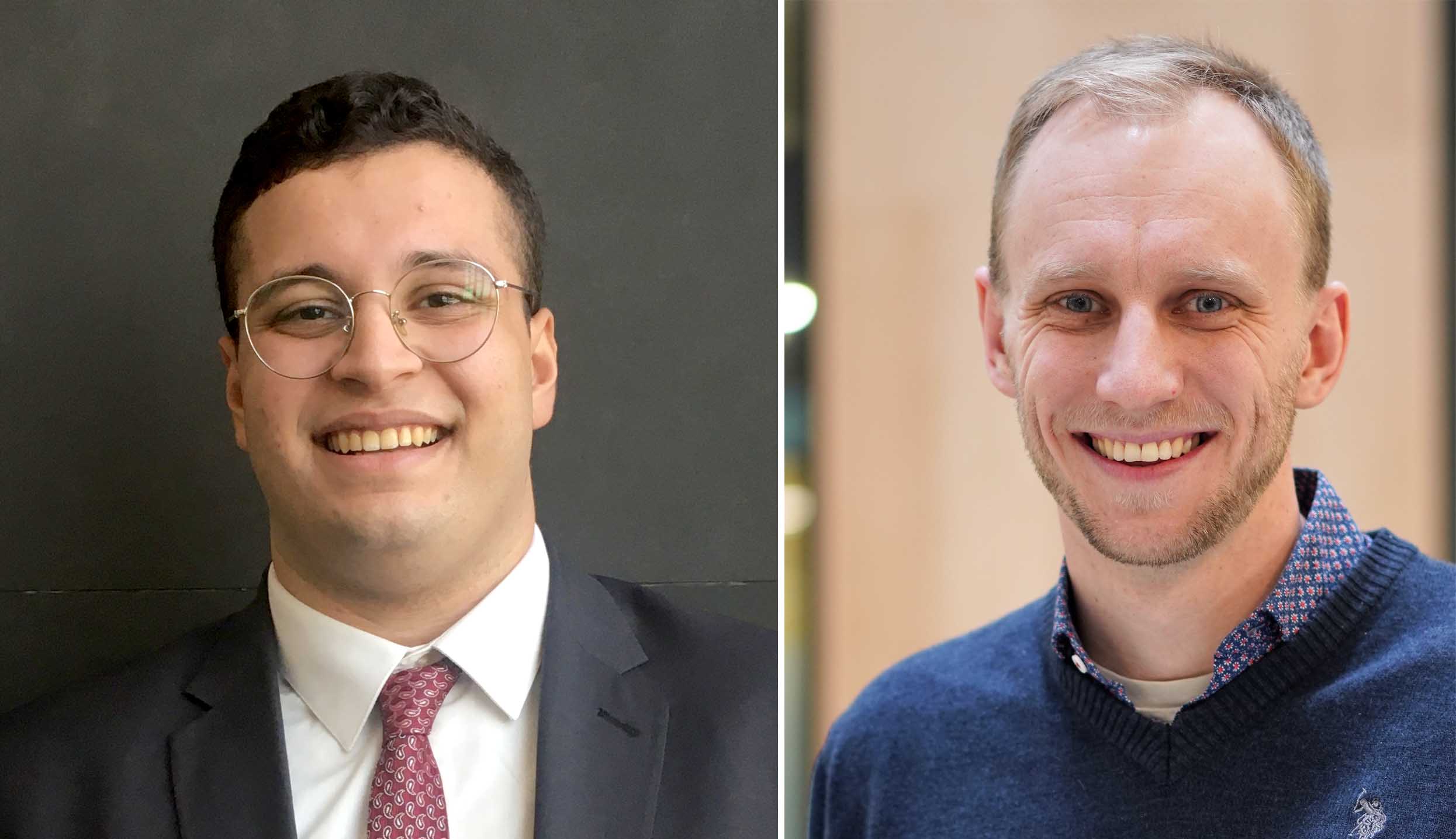
Omar Abdelazeem (CivMin MASc 2T3), a CivMin PhD student, and his supervisor, Prof. David Meyer, are this year’s winners of the Reproducible Research Award from ASCE’s Journal of Water Resources Planning and Management.
The Environmental & Water Resources Institute (EWRI)’s Awards Committee selected Abdelazeem and Meyer to win this award for their paper titled, How to Model an Intermittent Water Supply: Comparing Modeling Choices and Their Impact on Inequality.
“My stellar PhD student led this field-shaping work that compares different ways of simulating the performance of intermittent water supply systems, which affect one in five piped water users around the world,” says Prof. Meyer. “Omar worked really hard to ensure his data and code were reproducible – enabling others to validate, replicate, and build on our work.”
A 2019 study found that less than 2% of research papers in top water and hydrology journals have results that are reproducible (Stagge et al., https://doi.org/10.1038/sdata.2019.30). This led to a renewed focus on reproducible results in the journal we published in (JWRP&M). That journal added a new (optional) step for papers called a reproducibility review – where a peer reviewer tries to reproduce the results using the provided data and methods. The results produced by the CivMin group were reproduced by Dr. Stagge himself as part of this reproducibility review.
The award will be presented at the 2025 World Environmental and Water Resources Congress in Anchorage, Alaska, May 18 – 21, 2025.
The Jimmy Lu Jump Up and Down for Skule™ Award recognizes and supports those who embody the spirit of U of T Engineering

Even before he officially enrolled, Jimmy Lu (CivMin 1T0, MASc 1T3) knew that U of T Engineering was for him.
“The summer before my first year, I attended a reception for students who had received an offer of admission, but not necessarily accepted it yet,” he says.
“They had us doing all kinds of challenges, some of which were pretty silly. But they also required you to use math, science and creative thinking to solve problems, which is just what engineers do.”
“I liked that mix of being able to have fun, but also to do real things — it just felt right.”
Lu, who was born in Hong Kong but grew up in Toronto, quickly threw himself into all aspects of Skule™. One early highlight was during his second semester, when he won the Ultimate F!rosh competition, one of a series of Skule™ spirit events that take place during what is known as Godiva Week.
“One of the things about being named Ultimate F!rosh is that for the next year, any member of Skule™ can ask you to jump up and down, and you have to do it,” he says.
“People would yell it across campus, or in the hallways. It got to the point where if I heard those words, I just assumed people were talking to me.”
The experience did not tire him out; instead, Lu took on even more roles with the Engineering Society (EngSoc). By April of his first year, he was editing the F!rosh Handbook for incoming students.
In his third year, he was named Mr. Blue and Gold, while his close friend Jenn Eversley (CivMin 1T0, MEng 1T7) was named Lady Godiva. Together, these two characters led many of the spirit activities that take place during F!rosh Week and throughout the year.
Lu went on to serve as the EngSoc’s vice president of student life. In his final year, he was elected president of EngSoc, and helped organize the 2010 Canadian Engineering Competitions.
After finishing his undergraduate degree, Lu went on to complete an MASc under the supervision of CivMin Professor Bryan Karney. It was during this time that he met his life partner, Lisa Ye, a fellow U of T student in the Faculty of Nursing. They have now been together for 14 years.
From there, Lu moved into a series of roles that leveraged his passion for fighting climate change, including positions at The Atmospheric Fund, an environmental NGO, and at Ontario’s Independent Electricity System Operator.
But in 2023, Lu faced a challenge unlike any he had ever dealt with before. After months of unusual symptoms, he was diagnosed in July with glioblastoma, an aggressive form of brain cancer.
“There was about a week between my diagnosis and the surgery to remove the tumour,” he says.
“During that week, all I thought about were my favourite memories, and many were from U of T Engineering. They involved the friends I made there and experiences I had. It felt like I had lived a very rich life.”
Lu says he received an overwhelming amount of support: from his partner, his family, his friends, and coworkers.
His friends from U of T Engineering — led by Eversley — rallied to support him after the operation during his recovery and additional treatments. The care and strength he received from being part of the Skule™ community moved him deeply.
During his treatment, Lu was also struck by the degree to which the tools being used, from MRI machines to surgical devices, were all created and refined by engineers.
By the end of the summer, he had made up his mind to find a way to give back to the U of T Engineering community.
“When I got the call from Jimmy, I remember feeling shocked and saddened that someone so young must face something so difficult,” says Sonia De Buglio (ChemE 9T4, MASc 9T8) Director, Alumni Relations at U of T Engineering.
“At the same time, I felt very touched that in his moment of difficulty, he should be thinking about how he can give back and do something meaningful.”
The call kicked off a series of discussions between Lu and the U of T Engineering Advancement team, which eventually led to the creation of what is now called the Jimmy Lu Jump Up and Down for Skule™ Award.
This new endowed award will benefit students in perpetuity and will be presented annually to recognize the work of EngSoc vice-presidents who embody Skule™ spirit.
“Other than the president, who receives a small stipend, all of the student leaders from EngSoc and the other clubs and teams are volunteers,” says Lu.
“I wanted to find a way to recognize the value of that work, and the ripple effects it continues to have long after graduation.”
Lu’s classmates, along with several former Engineering Society Presidents and VPs, have already contributed tens of thousands of dollars to the new award. In December, Lu himself offered to match donations, helping the endowment exceed $50,000.
The award is just one of more than 600 awards distributed by the faculty to students each year, which are funded by generous donations from U of T Engineering alumni and supporters.
While his health poses ongoing challenges, Lu and Ye continue to live life to the fullest. Even while Lu was undergoing radiation and chemotherapy, the couple continued to travel the world together, and in late 2024, they had their first child.
Lu says that he wants the legacy of his award to be rooted in care and consideration for others.
“Kindness is a very strong focus for me now, because of all the kindness I’ve received, and just because it’s what we all deserve as humans,” Lu says.
“I want for us all to live in a kinder society. I hope that by giving back to Skule™, I can help to make that happen.”
By Tyler Irving
This story originally published by Engineering News
If you’d like to support the Jimmy Lu Jump Up & Down for Skule™ Award, please make your gift online. If you have questions, or would like to learn more about establishing your own student award, please contact Kristin Philpot at kristin.philpot@utoronto.ca
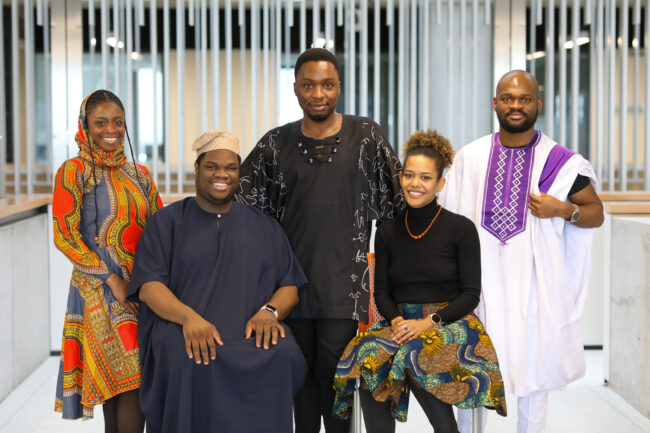
Thanks to a dedicated group of student leaders, Black-identifying members of U of T Engineering’s graduate student community now have more avenues for support and mentorship than ever before.
Though it officially formed in 2024, the genesis of U of T’s NSBE Graduate Student Chapter dates back to the spring of 2023. That’s when ECE PhD candidate Mai Ali travelled to Kansas City, Mo., to attend the Annual Convention of the National Society of Black Engineers (NSBE).
The yearly event brings together thousands of Black-identifying attendees to network among aspiring and professional engineers, pursue development opportunities and participate in competitions and career fairs.
“I was amazed by the community and the opportunities that were available, but I noticed that many events were geared towards undergraduate NSBE chapters,” says Ali, whose trip was sponsored by U of T Engineering’s office of the Vice-Dean, Graduate.
“I realized that Black graduate students need a place where we can meet, discuss our research and celebrate our achievements.”
When Ali returned to Toronto, she got to work establishing a graduate student chapter of NSBE at U of T with the support of the faculty’s Vice Dean, Graduate office.
She reached out to fellow Black engineering graduate students to gauge interest in forming the new group. The response was positive, and a call was made to form the executive committee, which first met in April 2024. The National Society of Black Engineers was founded in 1975 to promote and support the professional development and academic achievement of students pursing various engineering disciplines.
50 years later, there are more than 600 student chapters around the world with a mission to increase the number of culturally responsible Black engineers who can succeed professionally and positively impact their communities. U of T has been home to an undergraduate chapter of NSBE since 1999.

“One of our goals with the grad chapter is to increase the representation of Black students in engineering programs, whether it’s a graduate or undergrad program,” says Ali, who leads the chapter as president.
“We do this through high school outreach and undergraduate mentorship.”
“NSBE Grad is all about inclusivity,” says Caleb Okechukwu (MIE MEng student), the executive secretary of the organization. “We welcome the experiences of all individuals — not only Black students — whose ideologies align with our mission.”
NSBE Grad has worked with Engineering Outreach’s Blueprint program, BrainSTEM Alliance and has helped undergraduate students gain positive research experience through its Research Connect initiative.
The community is also a place for peers to socialize in a supportive environment where they can share their wins, challenges and their engineering expertise.
“This is a family of Black people that members can count on for support and advice for both academic and financial matters,” says Bethel Unwan (MIE MEng student), vice-president of NSBE Grad.
“I had a very hard time getting support and wouldn’t want anyone to go through the same.”

Ali says that as a Black researcher, she feels a heightened sense of responsibility.Her PhD research, supervised by Professor Deepa Kundur (ECE), focuses on using multi-task machine learning to predict mental health comorbidities in youth.
Traditional machine learning models directed towards mental health conditions often use single-task learning, which requires separate models for different tasks. This means conditions and symptoms such as depression, anxiety, sleep disruption or suicidal ideation are predicted in isolation rather than as multiple outputs at once.
“Mental health disorders are often comorbid, meaning that if you have any one of them, you may have a concentration of others,” says Ali. “If we are able to diagnose the full profile of the mental health disorders a person has, then interventions and treatment outcomes could be improved.”
“There is a lot of bias in machine learning models that are directed towards underrepresented communities, including Black youth,” she says. “More representation across all communities is necessary to both acknowledge and reduce this bias.
“But to increase representation, it’s important for Black undergraduate students and early-career researchers to have support from role models that understand their perspective in the profession. I have been fortunate to have that support in my academic career, especially now with my PhD supervisor, but I know others might not have that same experience.”
“Black undergraduate students who are interested in research should take advantage of NSERC Undergraduate Student Research Awards,” says Reke Ferdinand Avikpe (BME PhD candidate), treasurer of NSBE Grad.
“Don’t be afraid to reach out and engage with professors to find volunteer opportunities in their labs. I always encourage students to start early, from second and third year, and explore different lab opportunities until you find the research you enjoy most.”
In March, five members of NSBE Grad will be travelling to Chicago to participate in the 50th anniversary of NSBE at the 2025 annual convention.
“We are not only a new chapter but the only graduate student chapter in Canada, so it’s important for us to make a positive impression at the convention,” says Ali.
“So many people have been involved in getting our organization to this point, including all members of our executive committee; our advisor, Professor Philip Asare (ISTEP, EngSci); my PhD supervisor, Professor Kundur; and the faculty’s Vice Dean, Graduate office.”
By Safa Jinje
This story originally published by Engineering News
February 24, 2025 | CNET
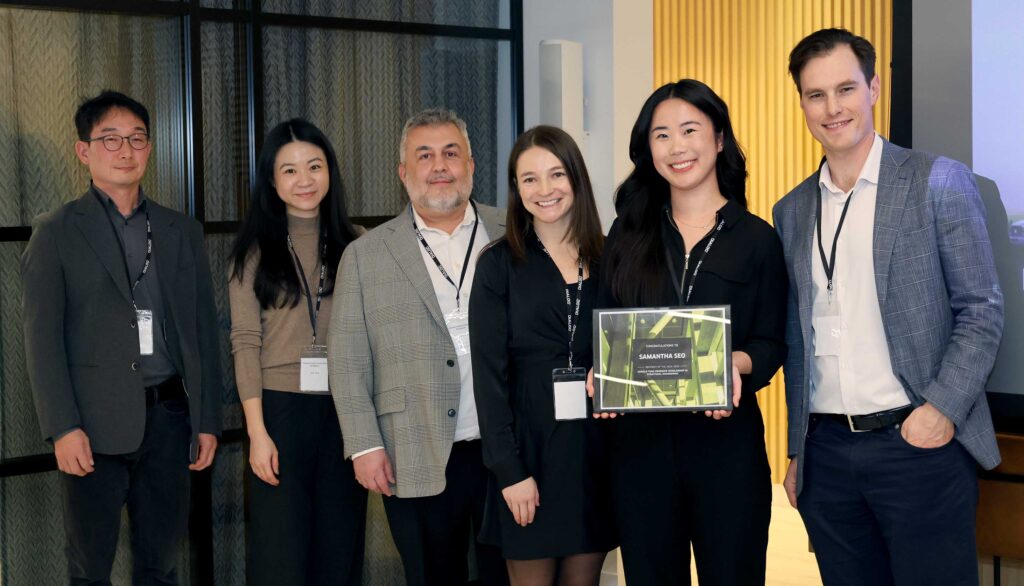
CivMin’s Samantha Seo, a CivMin MASc candidate under the supervision of Prof. Oh-Sung Kwon and Prof. Evan Bentz, has received the University of Toronto Donald Tong Graduate Scholarship in Structural Engineering from DIALOG.
The annual award was presented by company Partner Daria Khachi and Structural EIT Jordyn Tripp (CivE MASc 2T0) at a ceremony in the company’s downtown Toronto office on Monday, February 24. Seo is the sixth recipient of this award since its inception in 2019. We had a chat with her to learn a little more about them and their work.
Can you please tell us a little about yourself?
I’m currently a master of applied science student at University of Toronto, having done my undergrad at Waterloo. I started in June at U of T, working in the Structural Testing Facilities (STF). I kind of started backwards, doing lab work first, then starting my coursework. I’m currently doing research with Professor Oh-Sung Kwon and Professor Evan Bentz predicting leakage in nuclear containment structures. I’m originally from Toronto, so I’m back home for my master’s, and it’s nice to be like settled down after five years of moving every four months. It’s nice to be back home. I’m excited to get started at U of T, moving into my second semester and second year as well.
What does this mean to you to receive the Donald Tong scholarship from DIALOG?
I am honoured to have been selected for this award amongst several other highly talented first-year graduate student colleagues at U of T. I’ve interacted with many in the lab, as well as many in classes, and find them all amazing. I’m also a very big follower of DIALOG. My undergrad was in Arch Eng, so we used to use DIALOG buildings as precedents all the time. Not only for design, but also for graphical representation as well. For instance, wondering how did they show their structural system in a diagram. And really just respecting the qualities that DIALOG represents – a multi-disciplinary and collaborative approach to design, with the needs of our communities and the environment in mind. I find this is sometimes not a priority in firms exclusively focused on the engineering side of things. I also like how it’s very community focused as well interdisciplinary, and all the really big focuses that I care about in a building. Because, at the end of the day, it’s not just a building; you’re building communities from that. So yeah, I really have been following DIALOG since first year.
You’ve already done some interesting real-world work. Can you expand on this?
Yes, so I was a structural engineering intern at Tesla in Austin, Texas. A very niche, interesting job to be working at a car company, where I was helping build and prepare the facilities for the Cybertruck line. They were preparing for ramping upproduction and I was in the Factoring Engineering division providing design and on-site support during construction. Super fast-paced environment but an amazing learning experience.That was my sixth co-op role. In total, I have two years of working experience, and then some research experience at Waterloo and now with U of T.
You’ve completed first term and now are partially through second term, are there are classes or professor you recall as standing out or making an impact?
I took pre-stressed concrete with Professor Paul Gauvreau, which was very well structured (pun intended) and I really enjoyed that course. My background is in buildings, but Professor Gauvreau made it applicable to everyone, really, so I like that course. And I’m currently taking quantitative analysis and decision making with Professor Daniel Posen, which is very interesting, very applicable for any engineer. So very nice.
Do you have any place on campus you really like to visit?
I actually like the Robarts Library and I’m mainly in Galbraith Building, which isn’t the prettiest, but that’s where my office is, where the lab is. But I’ve been exploring different libraries like Knox and Gerstein.
Also, there’s a coffee truck right in front of Robarts, Caffe’In. I just go and get my usual coffee, but they have very interesting drinks, like yam coffee, blueberry latte, and more – it’s quite friendly for students.
Do you have any hidden talent, or fun facts about yourself, that you’d want to share with us?
I’m a big music fan and I’m always looking for concerts to go to. My music taste is all over the place but I’m always taking advantage of various online discounts. Toronto has some really great student discount programs for the arts, like Dance Break at the National Ballet and TSoundcheck with TSO, and even free memberships at the AGO. Also, I’m currently taking adult ballet classes at the National Ballet, though I didn’t have previous dance experience, but I started in high school.
By Phill Snel
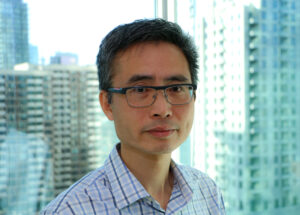
(Photo courtesy of Dialog)
The award is named for Dialog’s long-time structural team member Donald Tong, who tragically passed away in 2018 after a courageous battle with cancer. In an online description, Dialog provides insight into the motivation for the award: Donald epitomized the integrated design culture at the heart of DIALOG. He started his career as an interior designer, followed by a stint as an architectural technologist, before he found his passion in structural engineering. It is our hope that future structural engineers will embody Donald’s creative, wide-ranging design spirit.
Jane Tong, Donald’s daughter also present for the event, is continuing the family legacy of engineering as a career.
Raymond Bhushan (Year 4 MinE ) is the current President of Min Club, the discipline club for Lassonde Mineral Engineering students. Before commencing his final year of studies this year, he completed a PEY Co-op, relocating to Sudbury, Ont. for over a year last year. Additionally, Raymond is accomplished academically, having received the Okane Consultants Sustainable Mining Scholarship in his third year of studies. He recently talked with us about his experience in the LME program at U of T and of pursuing a role as MPP in provincial politics.
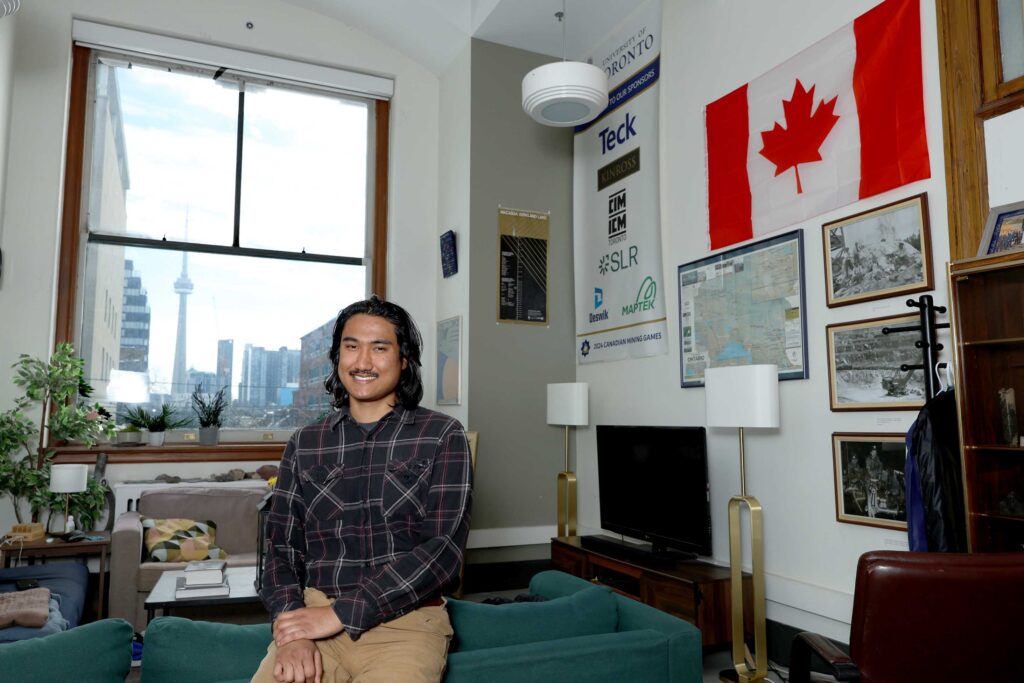
Raymond, please tell us about yourself as an introduction.
I am currently in my fourth year in the Lassonde Mineral Engineering program at U of T. I am the President of Min Club, which is the association for all the undergrad students in mining engineering. And I am currently running for office in this provincial election for the position of MPP, member of Provincial Parliament, in Richmond Hill as a candidate for the Ontario NDP.
I take it you grew up in the area you’re running?
Yes, I went to high school at Bayview Secondary School in Richmond Hill. And I grew up in the community and have a strong connection to it. That’s why I want to represent Richmond Hill.
What made you seek out your first leadership role, which is president of Min Club?
I was always involved in Min Club. Even in first year I was a class rep and I think that just kind of came out of a desire to organize and help my fellow students. I had a great mentor, Alec Gilvesy (MinE 2T2+PEY) who was president a couple years ago, and he encouraged me to become more involved in Min Club, to help plan activities to help and represent the interests of students. Overall, I’d say my reason for getting involved in Min Club is because I wanted to create [a better] experience for my fellow students.
Do you have any similar Feelings towards running for MPP in this election?
I think so. I think it’s a kind of commitment to, not my fellow students, but instead my fellow residents. A commitment to serving the public of Ontario.
I think we can all agree that not everything’s perfect. There are issues both in Richmond Hill and in Ontario that need to be resolved. Things like the housing crisis, rising unaffordability in terms of gas, groceries, and other living expenses. And I think, especially as students and young people, people like me at U of T are facing those issues – rent In Toronto is higher than ever. Or right across the province, in fact, the cost of living is higher than ever.
Climate change is making it harder to live in Ontario and affecting the environment in general. I think that’s part of the reason why I’m running, because a lot of these issues that are affecting Ontario are affecting me and my friends and my colleagues and my peers.
How do you feel about your area you’ve gone into academically as an engineer?
Do you think that’s something that’s made you better, perhaps more aware, better able to articulate some of the problems affecting the public and students overall?
Definitely. I think having a background in engineering definitely helps within the political sphere. I think politics shouldn’t be a space that’s dominated exclusively by lawyers and political science graduates. I think we, as engineers, need to become more involved in politics regardless of partisanship, regardless of whichever party you support. I think engineers are given the tools to identify problems and to seek solutions.
The entire engineering design process is about not just identifying what people say is a problem, but what is truly the problem that needs to be resolved. And what is the most effective strategy to resolve that. Now that could be an engineering design in the engineering sphere, or that could be a policy change in the political sphere. I think engineering also gives us the ability to engage in technical discussion, engage in research and engage in these kinds of communications between experts and non-experts that we also need in the political sphere.
What attracted you to apply to and attend U of T for Engineering?
I went to high school kind of in the GTA. So U of T was always the big place we would go. Whenever we’ve had conferences or tournaments or whatever for all the clubs I was in during high school. It was like a great experience for me as a kid, who was growing up in the suburbs, never being able to see the big city except for these rare opportunities.
So U of T kind of captured my heart that way – I always really wanted to go to U of T because it was right in the big city. There was so much going on and it has a reputation of having incredibly talented faculty members who are top of their fields, incredibly, incredibly talented students and peers who will become your coworkers in the future. And, overall, I think U of T is just such a great place … and I am incredibly fulfilled coming here.
You’ve had more than just academic experience. You spent more than a year in the real-world workforce on your PEY Co-op [Professional Experience Year Co-op] placement. Can you tell us a bit about this 16-month experience?
So, I spent 16 months at my co-op in Sudbury, working at the Copper Cliff Mine, doing a general mining engineering co-op term. I really enjoyed the experience. It gave me hands-on experience in the mining industry while getting to rotate around and see a lot of different sides of mining – right from ventilation to ground control to project management.
It also helped me meet so many amazing people. One thing, kind of unrelated to work, but more related to living in Sudbury is the fact it exposed me to different types of people. People who live in Richmond Hill and Toronto might have different values, and different ways of living, than someone who lives in northern Ontario.
And you don’t really think about how people live differently, how people act differently, the different values people have until you experience that firsthand. I think the experience not only benefited me as a person but also tying it back to politics and running in elections. It helps me empathize better with people from all sorts of different political stripes, all sorts of different backgrounds to understand them better because it’s very easy in today’s day and age, where everyone’s polarized, to dismiss people out of hand. In reality, everyone has their own experiences. Everyone has their own backgrounds, and I think there’s value in dialogue and communication.
Do you have any other clubs, groups or interests you’ve followed here at U of T while you’ve been a student?
Not unexpectedly, I’m part of the U of T NDP. It’s the campus club for the NDP representing the interests of students, to promote the party on campus and to get students involved in politics.
I think getting young people involved in politics is so important. Again, regardless of your political affiliation, I think if you’re a young person it’s incredibly important because there is a trend among political leaders of ignoring the needs of young people. They might see young people as unengaged and as an unreliable voting bloc; they see them as not necessary or not important in making governance decisions.
I think we, as young people, if we’re rightfully upset at our political leaders, we need to have that engagement. And whether that engagement is through a political party or whether it’s through a community organization, or whether it’s through a campus club, any involvement is important. Because that lack of political engagement, that lack of community engagement is harming our political environment and harming our social relations. I think civic engagement, at this point in time, is just so critical.
I was also part of another club too – the U of T Academic trivia club. Basically, it’s like quiz bowl, kind of like Reach For The Top, in the sense that they ask you trivia questions and you answer them. I joined that club in my first year and it helped me meet so many wonderful people – I made a lot of friends there too.
You’re in your fourth year, finishing up your undergraduate academic journey, and soon you’ll get your Iron Ring. If you could talk to your first-year self, just before starting, what sort of advice might you impart?
I think the most important piece of advice that I was ever told, and that I’ve been following ever since, was that you should always be saying yes to opportunities, and you should always seek out new opportunities. If someone you know asks you, “Hey, do you want to go do this. Hey, do you want to try this?” Just say yes. What’s what’s the worst that could happen, right?
I always say that when you’re lying on your deathbed, reflecting on your life, what are your biggest regrets going to be? They’re not going to be the things that you did; they’re always going to be the things that you never accomplished.
A couple weeks ago, I was giving a talk for our first-year students in Min and that was one of the pieces of advice that I was trying to hammer down: Say yes to new opportunities, try different things regardless of whether that’s in your career path, your academics or in your social life. Just try something new and say yes when the opportunity is presented.
If your friends or classmates ask you to watch a hockey game, even if you don’t like hockey, say yes. Because, you know, maybe you’ll learn you like it, maybe you learn you don’t like it, but at the end of the day, it’s, you know, time that you spend with your friends. If you get an offer for your co-op position and it’s somewhere you think you don’t like, just say yes. Just try it out. At the end of the day, it’s only four months or 12 months or 16 months, and maybe you’ll learn something new about yourself and like it.
On campus has there been anywhere that you found as your go-to spot or a secret spot for studying or socializing?
Well, not really a secret spot as it’s quite well known, but the Min Club Common Room. It’s, in my opinion, the best common room out of all the Engineering disciplines. We’ve got a beautiful view of the CN Tower and downtown buildings, a beautiful, big window that lets natural light in, and there’s always somebody there – from first year to fourth year. It’s always like people. To talk to people, to hang out with. It’s a good place to study. It’s a great place to socialize, and it’s such an integral part of the Min Club community.
And I also want to give a shout out to my current VP Finance, Rain Ferrer (Year 4 MinE), who has been doing a great job at improving the amenities in the common room, doing little things such as quality-of-life improvements – everything from better light bulbs to making it more overall more comfortable.
Are there any memorable courses or professors who have, stuck out to you during your nearly four years at U of T?
I think the Min program is just so blessed to have so many incredible lecturers and instructors and professors. And, honestly, all the Min courses I’ve taken have been quite good – I’ve enjoyed all of them.
I do want to give a special shoutout to Ryan Van Engen and Michel Julien, who taught MIN330 Mining Environmental Management, because that kind of helped me realize I do enjoy this aspect of mining in terms of environmental management, water management, tailings management. So, thanks to them, and thanks to the course, it kind of opened my eyes and exposed me to that sector. Since then, I’ve gone on to do more things in that area.
A couple of years ago I won the Okane Consultants Sustainable Mining Scholarship, again using the knowledge and interest I gained from that course. Then, at the Canadian Mining Games that I’m also part of, I took part in the sustainable development events because I find that super interesting, both academically and in practice.
Also, Alan Lambden, who teaches the Reserves and Resources course, I think he did a good job at teaching, but I also hung out with him outside of class too. Just getting a coffee with him and he’s a very supportive instructor. He has great experience and great wisdom as well.
And then, lastly, I want to give a shoutout to Professor Kamran Esmaeili. Not just for all the courses he teaches, but also because he’s such a big presence in the CivMin community. He’s been a huge proponent of developing our Min program further. He pushed for the creation of a Youth CIM student wing at U of T. So he really facilitated that and overall, he’s been a huge support for Min students – a pillar of support.
Do you have somewhere else around campus you like to go to socially or a special place for food near to campus?
I really like the pink food truck. I always get the spicy chicken burger combo there. I probably eat there more than I should, but the food is really good and it’s very convenient, very fast. He’s also very polite, so probably my favourite spot on campus to eat.
Do you have some sort of unusual talent or skill we wouldn’t otherwise know about, but care to mention here?
Normally, my fun fact is that I ran for office but, since you already know that, it’s not really a new fun fact. I did run in the last provincial election in 2022, which was about two-and-a-half years ago.
By Phill Snel
February 21, 2025 | Daily Commercial News